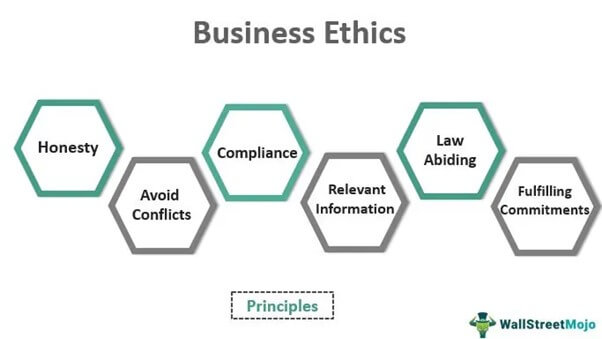
Business ethics is a branch of ethics that examines ethical behavior in the context of business organizations and the relationship between businesses and society. It is a complex and evolving field, as new ethical issues arise all the time. However, there are some core ethical principles that are generally accepted by businesses and society. These include:
- Honesty and integrity: Businesses should be honest and truthful in their dealings with customers, employees, suppliers, and other stakeholders. They should also be fair and impartial in their decision-making.
- Respect for people: Businesses should respect the rights and dignity of all people, regardless of their race, gender, religion, sexual orientation, or other personal characteristics. They should also create a safe and healthy work environment for their employees.
- Accountability: Businesses should be accountable for their actions. They should be transparent about their activities and be willing to take responsibility for any harm they cause.
- Sustainability: Businesses should operate in a way that is sustainable for the environment and future generations. They should use resources efficiently and minimize their environmental impact.
These are just a few of the ethical principles that businesses should strive to uphold. By following these principles, businesses can build trust and credibility with their stakeholders, and create a more ethical and sustainable world.
Ethical issues in business
There are many ethical issues that businesses face on a daily basis. Some of the most common ethical issues include:
- Marketing and advertising: Businesses must be careful not to make false or misleading claims in their marketing and advertising. They must also be respectful of people’s privacy and avoid collecting or using personal information without consent.
- Product safety: Businesses must ensure that their products are safe for consumers to use. They must also recall any products that are found to be defective or dangerous.
- Employee treatment: Businesses must treat their employees fairly and with respect. They must pay them a fair wage, provide them with safe working conditions, and allow them to join a union if they choose.
- Environmental impact: Businesses must operate in a way that is sustainable for the environment. They must reduce their use of resources, minimize their emissions, and protect wildlife and natural habitats.
- Corporate social responsibility: Businesses can also take steps to be socially responsible by giving back to the communities where they operate. They can do this by donating to charities, sponsoring community events, or providing job training programs.
The importance of business ethics
Business ethics is important for a number of reasons. First, it helps to build trust and credibility with stakeholders. When businesses operate ethically, they are more likely to be trusted by their customers, employees, suppliers, and investors. This can lead to increased sales, improved employee morale, and lower costs of capital.
Second, business ethics can help to prevent legal problems. When businesses violate ethical standards, they may be subject to lawsuits, fines, and other sanctions. These can be costly and damaging to a business’s reputation.
Third, business ethics can help to create a more sustainable and equitable world. When businesses operate ethically, they can help to protect the environment, improve working conditions, and promote social justice. This can benefit everyone, not just the businesses themselves.
The Future of business ethics
The future of business ethics is bright. As businesses become more globalized and interconnected, the need for ethical standards will become even more important. Businesses that operate ethically will be better positioned to succeed in the global marketplace.
There are a number of things that businesses can do to promote business ethics. These include:
- Adopting a code of ethics: A code of ethics is a written document that outlines the ethical standards that a business will uphold. It should be clear, concise, and easy to understand.
- Training employees: Employees should be trained on the company’s code of ethics and how to apply it in their everyday work.
- Encouraging whistleblowing: Employees should be encouraged to report any ethical violations that they see.
- Creating a culture of ethics: A culture of ethics is one where ethical behavior is the norm. This can be created by setting a good example from the top, providing training, and rewarding ethical behavior.
By taking these steps, businesses can create a more ethical and sustainable world.






